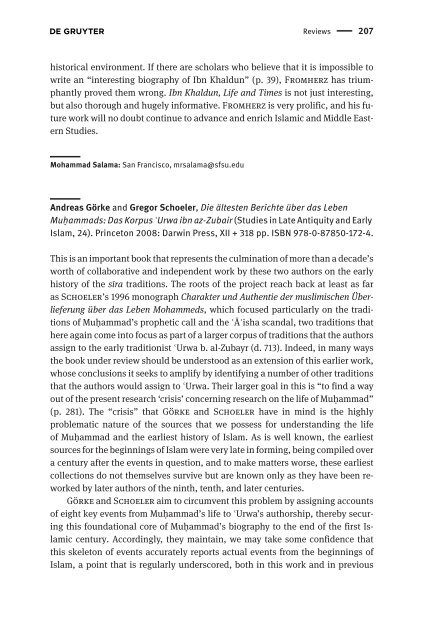0021-1818_islam_98-1-2-i-259
0021-1818_islam_98-1-2-i-259
0021-1818_islam_98-1-2-i-259
Create successful ePaper yourself
Turn your PDF publications into a flip-book with our unique Google optimized e-Paper software.
Reviews 207<br />
historical environment. If there are scholars who believe that it is impossible to<br />
write an “interesting biography of Ibn Khaldun” (p. 39), Fromherz has triumphantly<br />
proved them wrong. Ibn Khaldun, Life and Times is not just interesting,<br />
but also thorough and hugely informative. Fromherz is very prolific, and his future<br />
work will no doubt continue to advance and enrich Islamic and Middle Eastern<br />
Studies.<br />
Mohammad Salama: San Francisco, mrsalama@sfsu.edu<br />
Andreas Görke and Gregor Schoeler, Die ältesten Berichte über das Leben<br />
Muhammads: Das Korpus ^Urwa ibn az-Zubair (Studies in Late Antiquity and Early<br />
Islam, 24). Princeton 2008: Darwin Press, XII + 318 pp. ISBN 978-0-87850-172-4.<br />
This is an important book that represents the culmination of more than a decade’s<br />
worth of collaborative and independent work by these two authors on the early<br />
history of the sira traditions. The roots of the project reach back at least as far<br />
as Schoeler’s 1996 monograph Charakter und Authentie der muslimischen Überlieferung<br />
über das Leben Mohammeds, which focused particularly on the traditions<br />
of Mu1ammad’s prophetic call and the ^A#isha scandal, two traditions that<br />
here again come into focus as part of a larger corpus of traditions that the authors<br />
assign to the early traditionist ^Urwa b. al-Zubayr (d. 713). Indeed, in many ways<br />
the book under review should be understood as an extension of this earlier work,<br />
whose conclusions it seeks to amplify by identifying a number of other traditions<br />
that the authors would assign to ^Urwa. Their larger goal in this is “to find a way<br />
out of the present research ‘crisis’ concerning research on the life of Mu1ammad”<br />
(p. 281). The “crisis” that Görke and Schoeler have in mind is the highly<br />
problematic nature of the sources that we possess for understanding the life<br />
of Mu1ammad and the earliest history of Islam. As is well known, the earliest<br />
sources for the beginnings of Islam were very late in forming, being compiled over<br />
a century after the events in question, and to make matters worse, these earliest<br />
collections do not themselves survive but are known only as they have been reworked<br />
by later authors of the ninth, tenth, and later centuries.<br />
Görke and Schoeler aim to circumvent this problem by assigning accounts<br />
of eight key events from Mu1ammad’s life to ^Urwa’s authorship, thereby securing<br />
this foundational core of Mu1ammad’s biography to the end of the first Islamic<br />
century. Accordingly, they maintain, we may take some confidence that<br />
this skeleton of events accurately reports actual events from the beginnings of<br />
Islam, a point that is regularly underscored, both in this work and in previous


